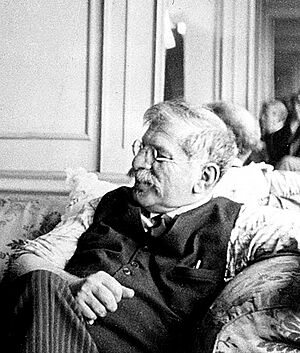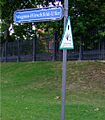Magnus Hirschfeld facts for kids
Quick facts for kids
Magnus T. Hirschfeld
|
|
|---|---|

Hirschfeld in 1932
|
|
| Born | 14 May 1868 |
| Died | 14 May 1935 (aged 67) Nice, France
|
| Resting place | Body cremated; ashes interred in Caucade Cemetery in Nice |
| Citizenship | German (revoked by the Nazis) |
| Occupation | Physician |
| Partner(s) |
|
Magnus T. Hirschfeld (born May 14, 1868 – died May 14, 1935) was a Jewish German doctor. His German citizenship was later taken away by the Nazi government. Hirschfeld studied philosophy, philology (the study of language), and medicine.
He started the Scientific-Humanitarian Committee. He worked in Berlin-Charlottenburg during the Weimar period. This was a time of big changes in Germany.
Hirschfeld was targeted by early fascists and later the Nazis. They disliked his Jewish background and his work for human rights. He was forced to leave Germany and live in France. He passed away there in 1935.
Hirschfeld's work helped start modern movements for human rights. These movements aim for fairness and understanding for all people. Many groups and awards are named after him today. These include the Magnus Hirschfeld Medal. There is also the Magnus Hirschfeld National Foundation.
Contents
Who Was Magnus Hirschfeld?
Magnus Hirschfeld was a very important German doctor. He was born in 1868 in a town called Kolberg. This town is now in Poland. He studied many different subjects. These included how people think (philosophy) and how languages work (philology). Most importantly, he became a medical doctor.
A Doctor Who Fought for Fairness
Hirschfeld believed in treating all people with respect. He worked hard to understand human differences. He wanted everyone to be treated fairly. He opened a special institute in Berlin. Here, he studied human behavior and identity.
He also started a group called the Scientific-Humanitarian Committee. This group worked to protect people's rights. They wanted to make sure everyone was understood. They fought against unfair laws. Their goal was to create a more accepting society.
Facing Challenges and Exile
Hirschfeld lived in Germany during a difficult time. The Nazis were gaining power. They were a political group that believed in hatred. They targeted Jewish people and anyone who disagreed with them. They also disliked Hirschfeld's ideas about human rights.
The Nazis burned many books from Hirschfeld's institute. They saw his work as "un-German." Because of this danger, Hirschfeld had to leave his home. He went to live in France. He died there in 1935, on his birthday.
His Lasting Legacy
Even after his death, Magnus Hirschfeld's ideas lived on. His work helped many people understand themselves better. He taught that all people deserve respect and kindness. He laid the groundwork for modern human rights movements.
Today, his name is remembered through awards and foundations. These groups continue his work. They promote understanding and fairness for everyone. There is even a riverside path in Berlin named after him. It is called Magnus-Hirschfeld-Ufer.
Images for kids
-
The Spree promenade Magnus-Hirschfeld-Ufer in Berlin-Tiergarten.
 | Kyle Baker |
 | Joseph Yoakum |
 | Laura Wheeler Waring |
 | Henry Ossawa Tanner |








